|
|
|
Sort Order |
|
|
|
Items / Page
|
|
|
|
|
|
|
| Srl | Item |
| 1 |
ID:
073266
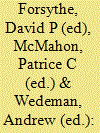

|
|
|
|
|
| Publication |
London, Routledge, 2006.
|
| Description |
vii, 350p.
|
| Standard Number |
0415953979
|
|
|
|
|
|
|
|
|
|
|
|
Copies: C:1/I:0,R:0,Q:0
Circulation
| Accession# | Call# | Current Location | Status | Policy | Location |
| 051538 | 327.730090511/FOR 051538 | Main | On Shelf | General | |
|
|
|
|
| 2 |
ID:
076220
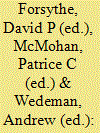

|
|
|
|
|
| Publication |
London, Routledge, 2006.
|
| Description |
vii, 350p.
|
| Standard Number |
0415953960
|
|
|
|
|
|
|
|
|
|
|
|
Copies: C:1/I:0,R:0,Q:0
Circulation
| Accession# | Call# | Current Location | Status | Policy | Location |
| 052283 | 327.730090511/FOR 052283 | Main | On Shelf | General | |
|
|
|
|
| 3 |
ID:
059606
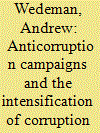

|
|
|
| 4 |
ID:
154434
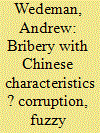

|
|
|
|
|
| Summary/Abstract |
This paper addresses the question of whether the way bribery is practiced in China is such that corruption might be compatible with rapid economic growth during the boom years between 2000 and 2007. In particular, it examines whether bribery based on diffuse reciprocity transforms a corrupt relationship from one based on short-term egoistic gains (looting) to one based on long-term gains (profit maximizing), with the assumption that such a form of bribery will lead the parties to maximize total gains and hence will encourage long-term growth rather than short-term predatory looting. More broadly, the paper inquires whether a regime of informal property rights based on bribery and diffuse reciprocity might compensate for the shortcomings of an imperfectly constructed and incomplete set of formal property rights such as has emerged in post-Mao China and thereby improve the prospects for economic growth. The paper concludes that while bribery based on diffuse reciprocity may encourage the parties directly involved in such corrupt exchanges to maximize their total long-term gains, so long as bribery remains a private good and an informal property rights regime based on bribery remains subject to abrupt and catastrophic revision due to its illegal nature, “bribery with Chinese characteristics” cannot be characterized as growth enhancing and thus cannot be a major explanation for why the Chinese economy grew rapidly during the “third boom.”
|
|
|
|
|
|
|
|
|
|
|
|
|
|
|
|
| 5 |
ID:
018239
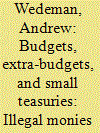

|
|
|
|
|
| Publication |
Nov 2000.
|
| Description |
489-512
|
| Summary/Abstract |
In the wake of repeated crackdowns on the 'three disorders' and 'small treasuries', it is obvious that local governments in China collect substantial amounts of illegal monies. What is not immediately obvious is how illegal monies matter. In this article, I assess both the amount of illegal monies that local governments collect and their significance relative to local autonomy. I find that because illegal monies are not rival to legal monies but rather complementary, although illegal monies may give local governments a greater ability to pursue their own particularistic agendas, they do not fundamentally alter the principalagent structures that link the localities to the center.
|
|
|
|
|
|
|
|
|
|
|
|
|
|
|
|
| 6 |
ID:
117716
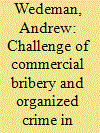

|
|
|
|
|
| Publication |
2013.
|
| Summary/Abstract |
Corruption has been classically defined as the misuse of public authority for private gain, which implies that corruption necessarily involves official authority and hence public officials. Bribery, however, often involves transactions between officials and private interests, including business interests, whereby the private party seeks to bend public authority to their advantage by paying off their official interlocker. Even in its classic form, therefore, corruption often spans both the public and the private. Public officials are not, however, alone in exercising authority. Managers and corporate officers also wield authority or fiduciary responsibility on behalf of others and can abuse that authority for private gain, not only in transactions involving public officials, but also in transactions with private parties. This article examines how China's anti-corruption institutions have dealt with 'commercial corruption', including both public-to-private corruption and private-to-private corruption. It also examines the linkages between organized crime and corruption in China.
|
|
|
|
|
|
|
|
|
|
|
|
|
|
|
|
| 7 |
ID:
154945
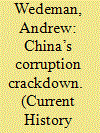

|
|
|
|
|
| Summary/Abstract |
“Xi’s crackdown on corruption has focused new attention on the much deeper issue of the relationship between power and wealth in contemporary China.”
|
|
|
|
|
|
|
|
|
|
|
|
|
|
|
|
| 8 |
ID:
184998
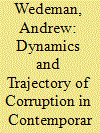

|
|
|
|
|
| Summary/Abstract |
Analysis of the data on the anti-corruption crackdown launched by Xi Jinping in late 2012 and early 2013 shows that its primary effect was to dramatically increase the number of senior officials—popularly known as “tigers”—charged with corruption. Heretofore, much of the debate about the crackdown has focused on who was been taken down and why. In this article, I shift the focus away from the “who” and “why” questions to a deeper question: what led to the proliferation of tigers? That is, how did corruption spread among the senior ranks of the party-state? Drawing on data on the tigers’ involvement in corruption, I argue that corruption was “promoted” upward during the years that preceded Xi’s crackdown. Xi’s fight with corruption has thus been a battle with corruption that spread first among the middle ranks of the party-state and then moved upward into the leadership as corrupt officials rose up through the ranks.
|
|
|
|
|
|
|
|
|
|
|
|
|
|
|
|
| 9 |
ID:
058456
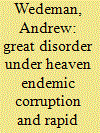

|
|
|
| 10 |
ID:
060323
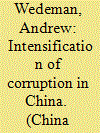

|
|
|
|
|
|
|
|